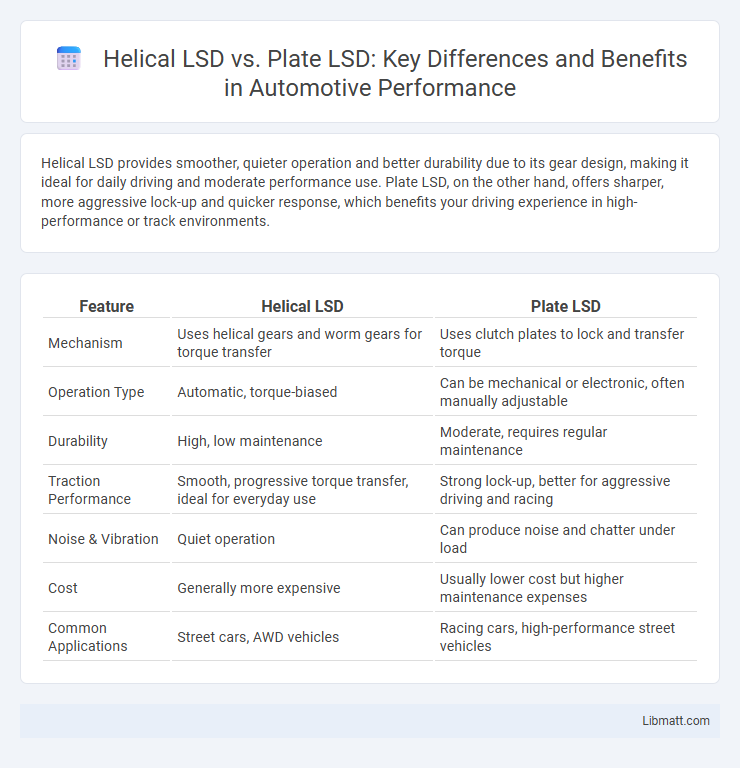Helical LSD provides smoother, quieter operation and better durability due to its gear design, making it ideal for daily driving and moderate performance use. Plate LSD, on the other hand, offers sharper, more aggressive lock-up and quicker response, which benefits your driving experience in high-performance or track environments.
Table of Comparison
| Feature | Helical LSD | Plate LSD |
|---|---|---|
| Mechanism | Uses helical gears and worm gears for torque transfer | Uses clutch plates to lock and transfer torque |
| Operation Type | Automatic, torque-biased | Can be mechanical or electronic, often manually adjustable |
| Durability | High, low maintenance | Moderate, requires regular maintenance |
| Traction Performance | Smooth, progressive torque transfer, ideal for everyday use | Strong lock-up, better for aggressive driving and racing |
| Noise & Vibration | Quiet operation | Can produce noise and chatter under load |
| Cost | Generally more expensive | Usually lower cost but higher maintenance expenses |
| Common Applications | Street cars, AWD vehicles | Racing cars, high-performance street vehicles |
Introduction to Limited Slip Differentials (LSDs)
Limited Slip Differentials (LSDs) enhance traction by distributing torque between wheels, preventing slip under varying conditions. Helical LSDs use a gear-driven design with angled splines to transfer torque smoothly, ideal for consistent grip and durability. Plate LSDs employ clutch plates that engage to limit slip, offering adjustable settings for aggressive driving and better control over your vehicle's handling.
What is a Helical LSD?
A Helical LSD (Limited Slip Differential) uses angled gears to transfer torque smoothly between wheels, enhancing traction without abrupt locking. Its design allows quieter and more predictable operation compared to a traditional Plate LSD, which relies on clutch plates to create friction for torque transfer. You benefit from improved control during cornering and better power distribution, especially on slippery surfaces.
What is a Plate LSD?
A Plate LSD (Limited Slip Differential) uses a series of clutch plates to manage the torque distribution between wheels, providing stronger and more immediate traction control compared to a Helical LSD. The clutches engage or disengage based on wheel slip, making Plate LSDs ideal for high-performance or off-road driving where rapid response is essential. Your vehicle's handling and stability can greatly benefit from the precise torque transfer that a Plate LSD offers under demanding conditions.
Key Differences between Helical and Plate LSDs
Helical LSDs use gears to provide smooth, automatic torque distribution between wheels, enhancing traction without wheel slip. Plate LSDs rely on clutch plates to create a mechanical lock, offering more aggressive torque transfer ideal for performance driving. Understanding these key differences helps you choose the right LSD based on your driving style and traction needs.
Performance Characteristics: Helical vs Plate LSD
Helical LSDs provide smooth, progressive torque transfer using worm gears, offering excellent stability and predictable traction during cornering without sudden lock-up. Plate LSDs rely on clutch plates to deliver more aggressive locking, enabling sharper handling and quicker response but may cause abrupt engagement and increased wear under high-stress conditions. Performance differences make Helical LSDs ideal for street and daily driving, while Plate LSDs suit track-focused or drifting applications demanding precise control.
Maintenance and Durability Comparison
Helical LSDs feature durable, gear-based mechanisms that require minimal maintenance and offer long-lasting performance under heavy loads due to their continuous torque transfer design. Plate LSDs rely on clutch plates that experience wear and necessitate periodic inspection, adjustment, or replacement to maintain optimal functionality. Overall, helical LSDs provide superior durability with less frequent maintenance compared to the more maintenance-intensive plate LSDs.
Street and Track Suitability
Helical LSDs offer smooth, predictable torque distribution ideal for street driving and occasional track use, providing enhanced traction during cornering without abrupt lock-up. Plate LSDs deliver quicker engagement and more aggressive locking, making them better suited for track environments where precise power control and rapid response are critical. Your choice depends on whether you prioritize everyday drivability with consistent grip or high-performance handling under demanding track conditions.
Cost and Value Considerations
Helical LSDs generally cost more upfront due to their complex design and enhanced performance, but they offer superior durability and smoother torque transfer, providing long-term value for aggressive driving or off-road use. Plate LSDs are typically less expensive and easier to maintain, making them a budget-friendly option for everyday street driving or occasional spirited use. Your decision should factor in how often you drive under demanding conditions versus the initial investment and maintenance cost.
Choosing the Right LSD for Your Vehicle
Choosing the right LSD for your vehicle depends on driving style, terrain, and performance goals. Helical LSDs offer smooth, automatic torque distribution ideal for daily driving and mild off-roading, while Plate LSDs provide aggressive locking characteristics suited for racing and high-performance applications. Understanding these differences ensures optimal traction, handling, and durability tailored to your vehicle's demands.
Conclusion: Helical or Plate LSD—Which is Better?
Helical LSD offers smoother engagement and quieter operation, making it ideal for daily driving and street performance, while Plate LSD provides faster lock-up and more aggressive traction control, favored in motorsports and track settings. Your choice depends on driving style: Helical suits those prioritizing comfort and durability, whereas Plate excels in high-stress, competitive environments. Consider your vehicle use and traction needs to select the optimal limited-slip differential for enhanced handling and performance.
Helical LSD vs Plate LSD Infographic

 libmatt.com
libmatt.com